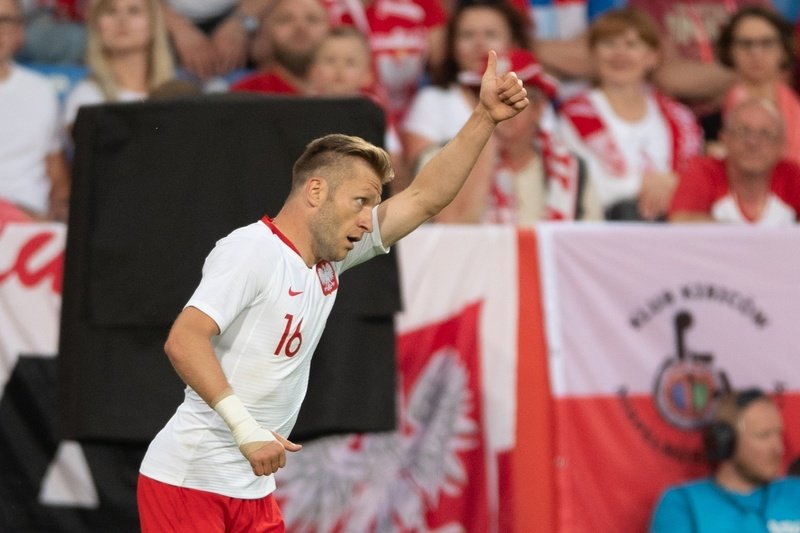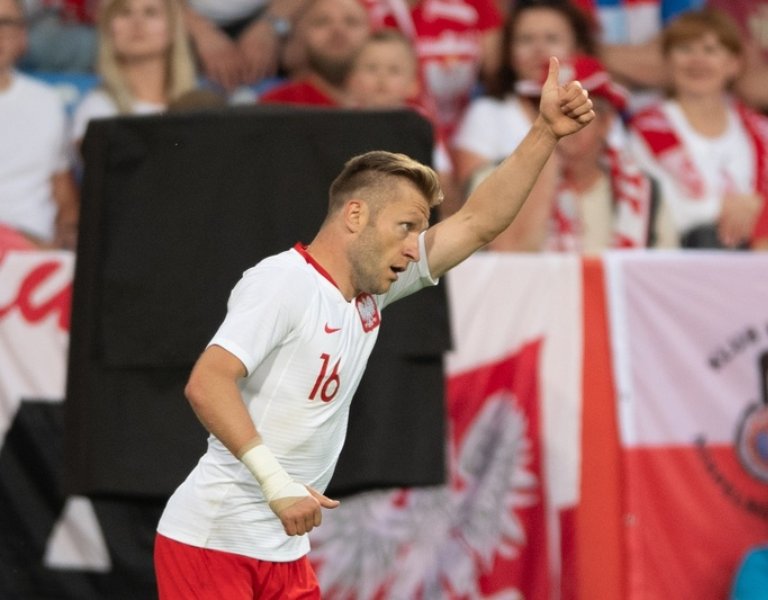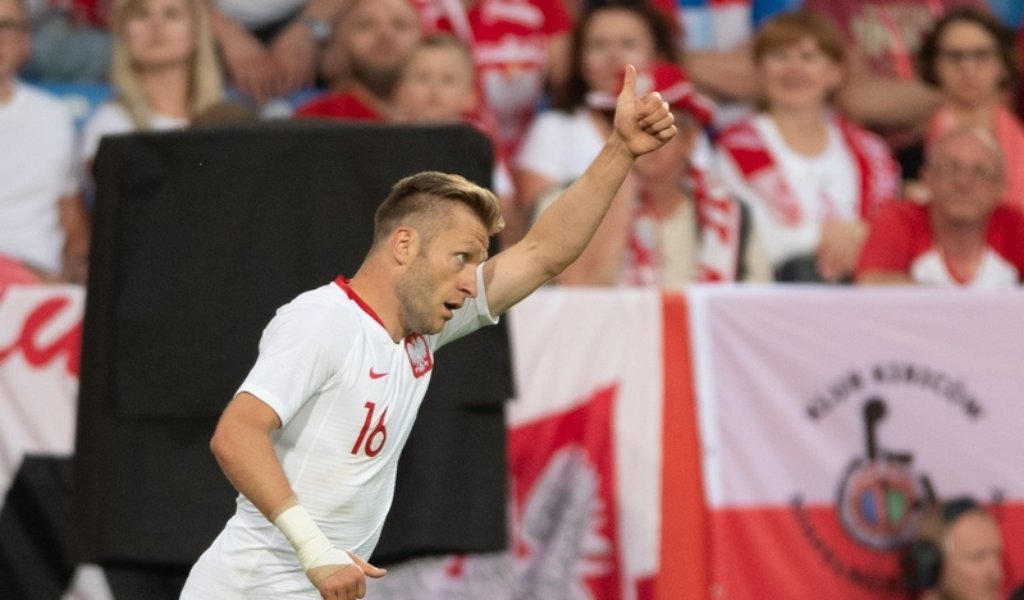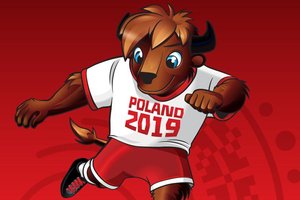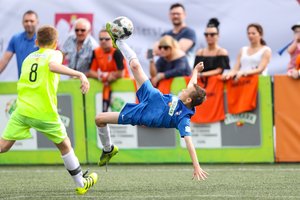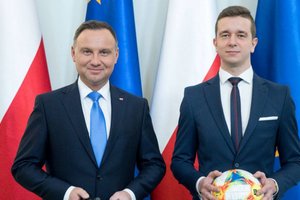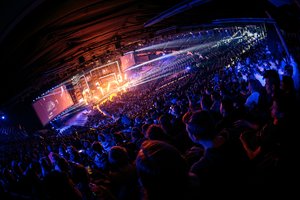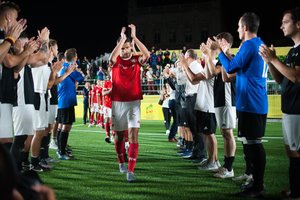Kuba Błaszczykowski: I feel power inside me
Jakub Błaszczykowski, member of the Polish national football team: I don’t remember anything after the goalie saved my kick. There were too many emotions, the brain switches off in such cases. I just went in to the changing room. I think.
Do you still think of the penalty kick when the Portuguese goalie saved your shot and we dropped out of the European Cup?
No.
I don’t believe it.
Then don’t. I haven’t thought about it, I don’t look back. I knew that if I did, I would only be tormenting myself. I try to distance myself from what happened, I received huge support from my family, friends and the fans.
Do you feel sorry when you watch the television reruns? Or pain?
I haven’t seen the kick replayed. Really, not one time. I don’t feel the need to. I think that the fact I saw it live, from the position of the kicker, is enough for me. Tearing open healed wounds makes no sense, it does not build a future.
And do you remember the moment when it dawned on you that that’s it, the end of the tournament? The end of your dreams?
I don’t remember anything after the goalie saved my kick. There were too many emotions, the brain switches off in such cases. I just went in to the changing room. I think.
The supporters back in Poland quickly forgave you. At the airport coming back from France it was you who was applauded the most, and the stadium at the last match against Slovenia went roaring when you entered the pitch.
It is for such moments that one trains, plays, gets up in the morning, sacrifices one’s life. It’s something I would never give away for whatever money. These moments will stay with me forever, I feed on them. Once my career is over, that’s what will stay, nobody will ever take that away from me. It’s all about titles and about whether the supporters have appreciated your work. The rest can pass, I don’t care. It was a very important year for me, it has given me lots of new experiences, reflections. It has taught me a lot as a human being. Some things you just have to go through, nobody will ever understand what the European Cup was for me.
Meaning?
There was a moment in Fiorentina where I trained before the tournament when I realized that whatever I did, I would not get to play in a match. It was a test of my character. I knew the Cup was getting close and that I had to be well prepared but, at the same time, I had to come to terms with the fact that I would not be regularly playing in the league. So I just had to grit my teeth and do everything I could, against all odds. It’s difficult to fight when you know that there is nothing you can do.
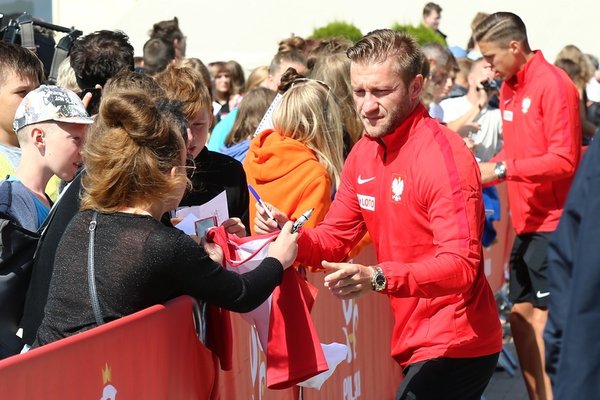 So what helped?
So what helped?
Experience. I knew that it was fate again wanting to check on me whether I would give up. I benefited from the fact that I knew my body and knew what I was capable of. I could prepare myself for the tournament because I lived it every day, it was the only thing that mattered – to play an important role in the national team.
You like such challenges...
There’s nothing to like. It’s not anything positive or pleasant in any way. Sometimes you just have to challenge yourself. In my line of work, apart from my performance on the pitch there is also the pressure from fans and the media. We learn our entire career how to cut ourselves off from that and, knowing our abilities, prove our worth anew in each single match. Nothing could change it over the fifteen years of my career. At least now I don’t read what they write about me.
Does it help?
All that I’ve lived through has taught me one very important thing. The only person who is able to change something in my life is only myself. Only I have control over myself, nobody else. Not the people who believe in me but are standing on the side, nor those who don’t wish me well. Too much praise can go into your head too much, and too much criticism will break you no matter how tough you are. Everything has to be thought through, it’s important to believe in yourself, inside. But it’s difficult when it’s hard.
When did you come to terms with yourself?
I never did, and nothing seems to show that I will. I keep on fighting. That’s my character. I keep wanting more, I search for negatives and keep thinking what I could do to improve. Perhaps it’s not helpful, I’m aware of that. On the other hand, however, if it wasn’t for this character of mine, I wouldn’t be where I am now. I know that many talented people that I have met in my life did not progress, mainly because they didn’t have the character.
I think that if Poland had won the European Cup, you would have said: “Well, yes, but the World Cup is in two years”…
That’s pretty possible. I have thought about it and I know that I can’t be different from the way I am. I can’t tell myself that I have done something cool and that I have achieved a lot already. It’s difficult, it gets harder every year because I am starting to realise that I will never be happy with myself.
There is no way to change it?
As long as I play, I will always want more. I will leave time for reflection until the end of my career. I will then have a better perspective as I will have no more chance to win a match.
Does it motivate you when others stop believing in you?
When in Florence, I trained with the Euro Cup in my head. The turning point was the March match against Serbia in Poznań. Everybody said that I was gone, that I would not make it without playing regular matches in the league. Błaszczykowski could not be in shape if he was too weak to play in the club. I must admit that it was a challenge for me, but that’s life and nothing can change it. I was only left with what I had control over, in other words to get well prepared and remind people that I was still alive.
We won against Serbia and you scored the only goal. Did you think: “I showed them now!”?
I never think like that about the things that happen to me. In no situation. I showed myself, others did not interest me.
Did you have moments of doubt?
Two months before the match against Serbia we talked about the European Cup in a small group, with only family and friends. I saw how everybody was just sitting there worried. I patted them on the back and said that everything would be ok, because I felt very strong internally. It’s a simple mechanism – the good physical condition positively influenced my head. I felt this power inside me, I felt that if I only want to, I can do it. And I wanted to.
Do you work with a psychologist?
No. the only way to achieve success for me is to process everything by myself. Instead of a psychologist I worked with my own experience. And I have lots of different experiences.
Those who don’t think have it easier?
I think and so I don’t know.
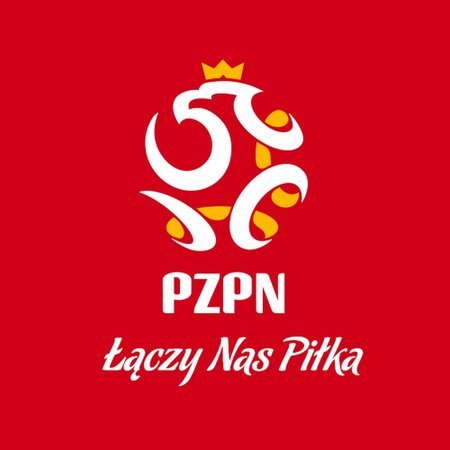 Do you feel mature?
Do you feel mature?
We would have to consider what is the definition of maturity. There is this inner kid inside of me. If you ever saw me when the doors to my house close behind me, you would see me fooling around with the kids… We all have this need to be a little naughty sometimes, no matter how old we are. I think that’s normal. Especially with us, guys, it’s something that’s with us the entire life. At times when you have to concentrate, when you need to fight, you need to be the tough man. And when you don’t have to, you can just joke around. I like joking around.
Do you cry watching a sad film?
No. I cry seeing human tragedies. I used to be more resistant before, now I have no strength left. It’s something that always gets to me.
You can’t save the world by yourself.
I accepted that a long time ago and I am not trying to do it anymore.
But you do react when people ask you for help. Also financially.
But that’s not in an attempt to save the world but a reaction to an inner need.
And what if a thousand people come to you for help?
I prefer to help a single person than not to help anybody at all. If I can manage I will help even ten people, but I don’t have such financial possibilities, so I also have to refuse. I have no pangs of conscience because I know that I do all that I can do.
Why are you now more sensitive than before?
The view of the world changes when your children are born. When you see a suffering child, it does not matter whether it’s your own or somebody else’s. It’s a child and you automatically step in the shoes of the parent who is helpless.
Are you trying to give to the world what you have been deprived of yourself?
That’s an exaggeration. I do it because that’s the way I feel. Only that. If people have to be persuaded to act in this way then I think we have strayed off the path.
Do you cry in the presence of your wife, at home? Is it manly?
It does not matter whether you feel embarrassed or not. What matters is what’s inside of you. If you need to express your emotions then it’s a normal, human thing. You cannot be ashamed of feelings and positive reactions.
Can you separate your private life from the professional one?
My wife has this incredible ability – she knows when to react and when not to. She knows when I’m uptight and it’s better not to come close to me, and then again she knows when she should ask something. I value it very much. She must have gained this skill over the years we’ve spent together. I am aware that I am not an easy person, and it does sometimes happen that I first need to digest a failure by myself. I don’t want to speak to anybody then, I need to go to training a few times to get it all out of my system.
Are you obnoxious sometimes?
Absolutely. I have my good and bad days. It’s not that I am constantly in a good mood and everything is just wonderful. But it’s important to keep on going. Like now, in Wolfsburg, when it’s not going too well for the team. It’s important to overcome the weaknesses, push on forward and try to mend everything.
Why did you establish the foundation Ludzki Gest [Human Touch]?
Together with my family and friends we thought that it was how we could help children. We are a young foundation and we are managing quite well, we have the support of many people and a whole lot of projects. On 27 December we are organizing a football tournament in Częstochowa with a concert of music from my youth – hip hop. Everybody is welcome! I think that we’ve set ourselves pretty ambitious goals and we want to keep on developing.
Who was your role model when you were a child?
I am the generation of Barcelona 1992, the captain of the Polish national team then was my uncle, Jurek Brzęczek, and I remember all the matches from that tournament. The semi-final against Australia won 6:1 and the unfortunate final against Spain… At the end of the game, uncle Jurek passed a nice ball to Ryszard Staniek and we evened to 2:2 only to lose in the final action of the game ending with Kiko scoring. I can still see it. The entire family came over to watch the match - why, half of the village came! That’s what brought me up.
Failure, loss. I was once at the museum of German football in Dortmund and it is a building of triumph. Don’t you think that if there was a museum of Polish football, it would be a museum of pain?
Why?
The match on water against the Germans, the lost finals at the Olympics, dropping out of the European Cup after a lost round of penalty kicks, I could go on.
I will end up in that museum once they put me in there. But now I am trying to look at it from a different perspective. The 1974 match in the heavy rainfall, on water, we can see it as injustice because we were better. While the Olympic finals was also a success, after all we got silver.
And what would you put in the museum gallery dedicated to Euro 2016?
I would not make such a gallery. We had an OK result but it was not a success worth remembering for years. The Germans show all their moments of glory and somehow omit the weaker ones, for example they don’t show the times in between the world titles, and we know that sometimes things weren’t so rosy. Sometimes they would not get through the qualifying rounds. But that’s their great strength – that they know how to praise themselves. We should learn from them, learn how to be proud of ourselves. Poles are good people. We have good hearts.
Do you sometimes think of yourself as a legend?
It would never cross my mind.
Kids want to be Błaszczykowski…
But that doesn’t make me a legend. I can’t put myself in such a position. We, football players, we do what we have to do – I am happy that my job is also my hobby, that I do what I love and for good money. But, at the end of the day, it’s a job, like any other – of a policeman or a doctor. Or maybe not just like any other but much less important. A doctor is responsible for people’s lives, they don’t show it on television but doctors are the heroes of our everyday. We only kick a ball. Actually, it’s the sports journalists who have it pretty cool. Before the match against Serbia it was OKk for you to write that I am no good, after the match, you wrote that I was magnificent – you bear no responsibility for your words.
Is it why you speak so rarely to the media?
Not rarely, I virtually don’t speak to the media at all. I’d rather have a conversation instead of having to say “good” or “bad” in response to “So, how was it?” after the match. These interviews after the last whistle make no sense. I have sometimes wondered how you feel when you assess our work not seeing how much heart, dreams and health we give during our daily practices. You are evaluated by your boss, and when you have a bad day, you just get sent home. When writing an article about us, you present your own assessment of us to millions of supporters. That gives us additional pressure that we have to deal with. When writing my book, I mentioned Justyna Kowalczyk, who had huge successes but who also had sacrificed a lot. To me she was at a certain point treated like a machine. Although she no longer could, she was still expected to win. I believe that she should not have been expected to do anything, she knows how much her races cost her health. You often forget about it.
Let us go back to the kids on the playground. If somebody wanted to be like Błaszczykowski, would you tell them to just let it go and seek a different profession? Or would you encourage them?
I would recommend humility and much perseverance. Because there may be a lot of nice moments to come but they all have to be earned. I would hope that my example makes kids aware that one should never give up. Because talent is not enough. There have been many who had the talent and could achieve more than I have but they gave up.
We met during your vacation break. We ordered beer but when you saw there were lots of kids around, you quickly changed your order to tea. Do you feel responsible for young people?
I am a role model to these people and I don’t want to set a bad example. I know that I am on vacation but why should I drink beer for everybody to see? This could lead to a situation that a kid might want to buy himself a beer because Błaszczykowski also drinks beer. I’m even wondering whether it’s ok that we even talk about it now because it shows, on the one hand, that I am aware of the role I should play, but on the other… these kids can read, after all.
Maybe if there was no alcohol in the national team, the European Cup would not end at the quarterfinals?
Let’s not fall from one extreme into the other. The Euro was a success, we found ourselves in a group of top eight teams on the continent. I remember when I was giving an interview in Arłamów before the tournament, and to a question whether I would go for finishing at the level of quarterfinals I said that it all depended. When it all ends after a round of penalty kicks then the pain is bigger than when you just lose 0:2, in which case you know that you were simply worse and that’s it. I am happy that after that tournament our team still shows that it’s got reserves. We won against Romania 3:0 and again looked at our capabilities with a fresh eye. After the 2:2 draw with Kazakhstan, the fans were not in the best of moods.
Łukasz Piszczek said that not until he finishes his career will he confess what could have been better at the European Championship. What do you think he meant?
I don’t know but I agree that it could have been better. But then again, it could have been worse. But I don’t want to divide people into those who see the glass either half full or half empty. I simply expect an ordinary, balanced assessment of the situation. Thinking now whether I could have given the team more in France will not change anything. It is the collected experience that matters.
Is football a team sport?
Yes.
But isn’t it that too much depends on the disposition of specific players?
You’re as good as your weakest player. Let us remember that there are eleven guys on the pitch on the other side, and some of them may also have a worse day. That is why it is the team that counts. Because the one who has a better day can take on himself a bigger burden and pull the rest. The situation in other matches may change and it is you who might need bigger support. These are the foundations on which trust is built, which later leads to greater successes.
Did you all have enough of each other in France?
We were absolutely not tired of each other, hence the great atmosphere in the team. The whole preparation phase was very wisely planned. We were not made to be with each other the entire two months, there were breaks, we could go home, see our families or friends.
The whole alcohol scandal which erupted after the matches against Denmark and Armenia – was that a serious problem or was is blown out of proportions?
We won the next game 3:0 and, of course, you could write that it was because some wanted to redeem their sins, but we’ll never find out what would have happened if the whole thing had not been revealed. When in Romania, we played our best away match for a long time, we knocked the rivals cold. We had them all figured out. As far as the alcohol scandal is concerned, there were such things written about it that I lost track. The whole story began to live a life of its own. Apart from that I think that we should learn how to solve such situations internally. That would prove how strong the group is.
Do you drink at all?
I’m a normal person. I do what I feel like, and what does not get in the way of my normal life and work. For reason of my profession I let myself drink alcohol only during breaks in between rounds, but after all, it’s no crime. It’s only important to know how, where and when.
How do you find yourself in Wolfsburg?
I adapted quickly. The few years in Borussia Dortmund helped, I knew the culture, the specificity of the league, generally – the everyday life in Germany. I knew what to expect. The organisation of my new club is absolutely top notch. All I have to do is play. When choosing a new club, I tagged Germany with the label “priority”. After the ten months in Florence I wanted to go back to an environment I knew. I just had a good tournament behind me and it was from Wolfsburg that I was getting signals from the very beginning that both the manager and the sports director wanted me in the team. I wanted a club which I knew would count on me.
When you were leaving Dortmund, the fans could not forgive the Borussia management for this decision. Is it difficult to gain recognition abroad?
I feel grateful to the BVB supporters for appreciating me. It’s not very often that a former player of a beloved team is treated the way I am. They thanked me for my game and for my engagement. I met many valuable people in Dortmund, that time will always be with me, in my head and in my heart. We had a magnificent time as a team, we developed together with manager Juergen Klopp, and that was reflected in our results. We grew up together. I am still in touch with people I met in Borussia and I am very happy to have had the chance to play in that club.
Is there anything in Wolfsburg apart from the Volkswagen plant?
I have never been interested in the attractions of the city in which I play. My priority is what the club has to offer. Apart from that I have a slightly different view of what is a nice city – to me, it’s enough that I have somewhere to go with my children so that they can play, that it’s clean and quiet. And if you think there is only the factory, go see the “Autostadt”, it’s very impressive.
By: Michał Kołodziejczyk
Source: ‘Rzeczpospolita’
11.06.2018
